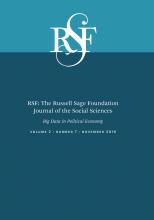Research Article
Open Access
Introduction: Big Data in Political Economy
Atif Mian, Howard Rosenthal
RSF: The Russell Sage Foundation Journal of the Social Sciences November 2016, 2 (7) 1-10; DOI: https://doi.org/10.7758/RSF.2016.2.7.01
Atif Mian
aTheodore A. Wells ’29 Professor of Economics and Public Affairs at Princeton University
Howard Rosenthal
aTheodore A. Wells ’29 Professor of Economics and Public Affairs at Princeton University

REFERENCES
- Albertson, Bethany, and Shana Gadarian. 2014. “Was the Facebook Emotion Experiment Unethical?” Washington Post, July 1.
- ↵Baker, Scott. 2014. “Debt and the Consumption Response to Household Income Shocks.” April. http://web.stanford.edu/~srbaker/Papers/Baker_DebtConsumption.pdf (accessed May 31, 2016).
- ↵
- Bartels, Larry M. 2009. Unequal Democracy: The Political Economy of the New Gilded Age. Princeton, N.J.: Princeton University Press.
- ↵Bhatti, Yosef, and Robert S. Erikson. 2011. “How Poorly Are the Poor Represented in the U.S. Senate?” In Who Gets Represented? edited by Peter K. Enns and Christopher Wlezien (New York: Russell Sage Foundation).
- ↵
- ↵
- Bonica, Adam
- ↵
- ↵
- Bonica, Adam,
- David J. Rothman, , and
- Howard L. Rosenthal
- ↵
- Bonica, Adam,
- David J. Rothman, , and
- Howard L. Rosenthal
- ↵
- Brunner, Eric,
- Stephen L. Ross, , and
- Ebonya Washington
- ↵Chae, David H., Sean Clouston, Mark L. Hatzenbuehler, Michael R. Kramer, Hannah L. F. Cooper, Sacoby M. Wilson, Seth I. Stephens-Davidowitz, Robert S. Gold, and Bruce G. Link. 2015. “Association Between an Internet-Based Measure of Area Racism and Black Mortality.” PLOS ONE (April 24).
- ↵
- Dobbie, Will, and
- Jae Song
- ↵Edsall, Thomas B. 2013. “When Class Trumps Identity.” New York Times, October 29. http://www.nytimes.com/2013/10/29/opinion/edsall-when-class-trumps-identity.html (accessed May 23, 2016).
- ↵
- Erikson, Robert S., and
- Thomas R. Palfrey
- ↵
- Gentzkow, Matthew, and
- Jesse M. Shapiro
- ↵Giannetti, Daniela. 2010. “Secret Voting in the Italian Parliament.” Paper presented at the annual meeting of Rationalité et Sciences Sociales. College de France, Paris (June 3–4).
- ↵Griffin, John M., and Gonzalo Maturana. 2013. “Who Facilitated Misreporting in Securitized Loans?” Working paper. University of Texas, Austin.
- ↵Hersh, E. D., and M. Goldenberg. 2016. “Political Spillover Effects on Physician Clinical Practice.” Working paper. Yale University, New Haven, Conn.
- ↵Imai, Kosuke, James Lo, and Jonathan Olmsted. 2015. “Fast Estimation of Ideal Points with Massive Data.” Working paper. Princeton University.
- ↵Jessee, Stephen A. 2012. Ideology and Spatial Voting in American Elections. New York: Cambridge University Press.
- ↵
- Keys, Benjamin J.,
- Amit Seru, , and
- Vikrant Vig
- ↵Kim, In Song. 2014. “Intra-industry Trade and Trade Liberalization: Evidence from Dyad-Level Tariff Data.” Working paper. Massachusetts Institute of Technology, Cambridge.
- ↵
- Levitt, Steven D
- ↵Lewis, Jeffrey B., and Chris Tausanovitch. 2015. “When Does Joint Scaling Allow for Direct Comparisons of Preferences?” Working paper. University of California, Los Angeles.
- ↵
- ↵McCarty, Nolan, Keith T. Poole, and Howard Rosenthal. 2006. Polarized America: The Dance of Ideology and Unequal Riches. Cambridge, Mass.: MIT Press.
- ↵Mian, Atif, and Amir Sufi. 2014. House of Debt: How They (and You) Caused the Great Recession, and How We Can Prevent It from Happening Again. Chicago: University of Chicago Press.
- ↵Mian, Atif, and Amir Sufi. 2015. “Fraudulent Income Overstatement on Mortgage Applications During the Credit Expansion of 2002 to 2005.” Working paper. Princeton University and University of Chicago.
- ↵
- ↵Mian, Atif, Amir Sufi, and Nasim Khoshkhou. 2016. “Government Economic Policy, Sentiments and Consumption.” NBER working paper.
- ↵
- O’Halloran, Sharyn,
- Sameer Maskey, ,
- Geraldine McAllister, ,
- David K. Park, , and
- Kaiping Chen
- ↵Piketty, Thomas. 2014. Capital in the Twenty-First Century. Cambridge, Mass.: Belknap Press of Harvard University Press.
- Piketty, Thomas, and
- Emmanuel Saez
- ↵
- Poole, Keith T., and
- Howard L. Rosenthal
- ↵Poole, Keith T., and Howard L. Rosenthal. 2007. Ideology and Congress. New Brunswick, N.J.: Transaction Publishers.
- ↵
- ↵Wolfinger, Raymond E., and Steven J. Rosenstone. 1980. Who Votes? New Haven, Conn.: Yale University Press.
In this issue
Introduction: Big Data in Political Economy
Atif Mian, Howard Rosenthal
RSF: The Russell Sage Foundation Journal of the Social Sciences Nov 2016, 2 (7) 1-10; DOI: 10.7758/RSF.2016.2.7.01
Jump to section
Related Articles
- No related articles found.
Cited By...
- No citing articles found.





